On Tuesday, Myanmar’s junta-controlled media announced a ban on satellite television receivers citing outside broadcasts as a threat to national security. Those caught violating the latest measure risk a year-long jail sentence and a hefty fine. The new curbs come in addition to the previous cuts on mobile internet access that have been in place since the military coup on February 1.
“Satellite television is no longer legal. Whoever violates the television and video law, especially people using satellite dishes, shall be punished with one-year imprisonment and a fine of 500,000 kyats (US$320),” MRTV state television said. “Illegal media outlets are broadcasting news that undermines national security, the rule of law and public order, and encouraging those who commit treason,” it added.
In another effort to curb freedom of the press in the country, Myanmar’s junta charged a Japanese journalist under a “fake news” law on Monday, which ironically coincided with World Press Freedom Day. Freelance reporter Yuki Kitazumi was arrested on April 18 and charged with spreading false information earlier this week, according to a report by Kyodo news agency. Kitazumi is one of 50 journalists currently being held in Myanmar as part of the junta’s crackdown on the media, which has been reporting on the ongoing political crisis; 25 of them been prosecuted, two are awaiting bail, and 29 others are evading arrest warrants.
According to a local monitoring group called the Assistance Association for Political Prisoners (AAPP), a total of 766 civilians have been killed by security forces and 3,614 people have been detained since the protests against the military government began in early February. In response to the violence and curbing of civil liberties, Myanmar’s ambassador to the United Nations (UN) urged the United States (US) Congress to increase pressure on the Min Aung Hlaing government by introducing new sanctions targeting the state-owned Myanmar Foreign Trade Bank (MFTB) and Myanmar Oil and Gas Enterprise (MOGE). The Joe Biden administration, along with several other world powers, has already imposed sanctions on a dozen current and retired high-ranking officials of the Myanmar military. However, the junta has remained unperturbed and continues to infringe on its citizens’ democratic freedoms.
The South Asian country has spiralled into crisis over the last three months, in the aftermath of the military’s forceful seizure of the government, and brutal suppression of dissent. State Counsellor Aung San Suu Kyi and President U Win Myint, along with other prominent pro-democracy leaders remain under house arrest. The putsch was attributed to the failure of the government to act on the military’s questionable claims of voter fraud in the election conducted last November when the National League for Democracy (NLD) won in a landslide victory with 83% of the votes. Seeing the overwhelming support for the NLD, the military sought to reinforce its dominance via a coup.
Myanmar Bans Satellite TV, Citing Threat to National Security
Further curbing media freedom in Myanmar, the country’s junta-controlled media announced a ban on satellite television receivers, alleging that outside broadcasts threatened national security.
May 5, 2021

SOURCE: AP
